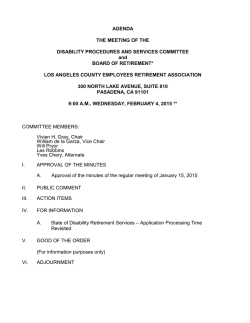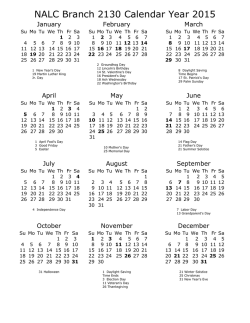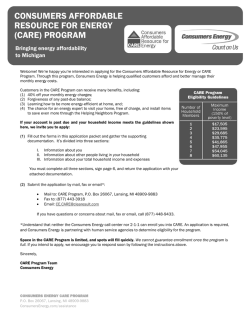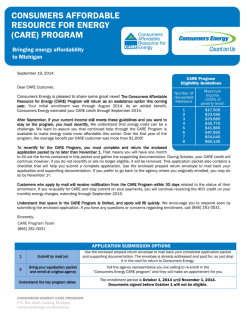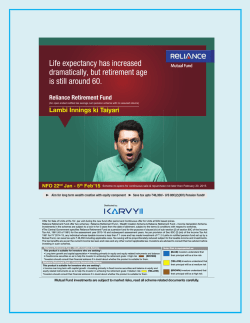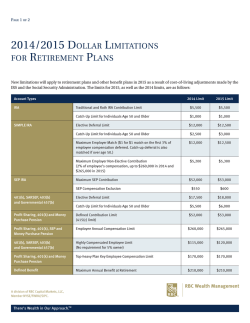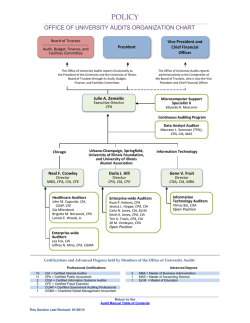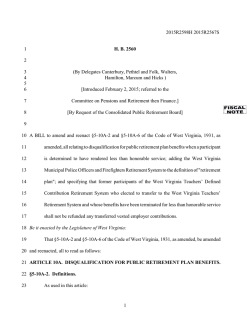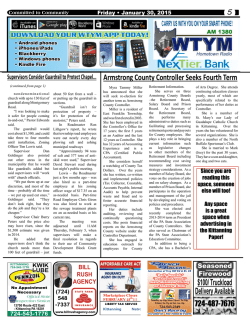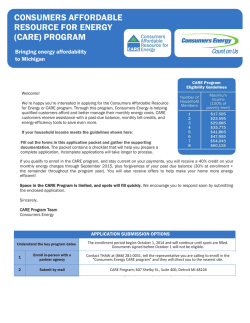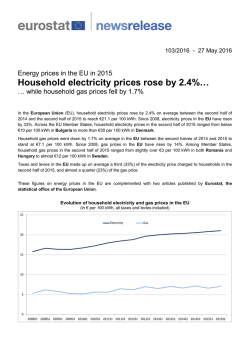
here - Cornerstone Financial Associates
Jan/Feb 2015 1 Peter 2:6 406.238.9700 225 North 23rd St. Billings, MT 59101 www.cornerstonefa.com [email protected] Inside This Issue: Household Cash Flow 1 Getting a Jump on Tax Season 2 Young Families Can Save and Invest 3 Who’s Tent Are You Living In? 4 Seminar Volume 4 Issue 1 Getting Your Household Cash Flow Back Under Control Developing a better budgeting process may be the biggest step toward that goal. Where does your money go? If you find yourself asking that question from time to time, it may relate to cash flow within your household. Having a cash flow management system may be instrumental in restoring some financial control. It is harder for a middle-class household to maintain financial control these days. If you find yourself too often living on margin (i.e., charging everything) and too infrequently with adequate cash in hand, you aren’t the only household feeling that way. Some major economic trends really have made it more challenging for households with mid-five-figure incomes. By many economic standards, today’s middle class has it harder than the middle class of generations past. Some telling statistics point to this... Mark Cain, LUTCF *In 81% of U.S. counties, the median income is lower today than it was in 1999. Even though we are in a recovery, much of the job growth in the past few years has occurred within the service and retail sectors. (The average full-time U.S. retail worker earns less than $25,000 annually.) *Between 1989 and 2014, the American economy grew by 83% (adjusting for inflation) with no real wage growth for middle-class households. *In the early 1960s, General Motors was America’s largest employer. Its average full-time worker at that time earned the (inflation-adjusted) equivalent of $50 an hour, plus benefits. Wal-Mart now has America’s largest workforce; it pays its average sales associate less than $10 per hour, sometimes without benefits.1,2 Essentially, the middle class must manage to do more with less – less inflation-adjusted income, that is. The need for budgeting is as essential as ever. Much has been written about the growing “wealth gap” in the U.S., and that gap is very real. Less covered, but just as real, is an Achilles-heel financial habit injuring middle-class stability: a growing reliance on expensive money. As Money-Zine.com noted not long ago, U.S. consumer debt amounted to 7.3% of average household income in 1980 but 13.4% of average household income in 2013.3 So how can you make life more affordable? Budgeting is an important step. It promotes reliance on cash instead of plastic. It defines expenses, underlining where your money goes (and where it shouldn’t be going). It clears up what is hazy about your finances. It demonstrates that you can be in command of your money, rather than letting your money command you. Buy the right kind of car & do your cash flow a favor. Many middle-class families yearn to buy a new car (a depreciating asset) or lease a new car (because they want to be seen driving a better car than they can actually afford). The better option is to buy a lightly used car and drive it for several years, maybe even a decade. Unglamorous? Maybe, but it should leave you less indebted. It may be a factor that can help you to ... Plan to set some cash aside for an emergency fund. According to a recent Bankrate survey, about a quarter of U.S. households lack one. Imagine how much better you would feel knowing you have the equivalent of a few months of salary in reserve in case of a crisis. Again, you can budget to build it – a little at a time, if necessary. The key is to recognize that a crisis will come someday; none of us are fully shielded from the whims of fate.3 Don’t risk living without medical & dental coverage. You probably have both, but some middleclass households don’t. According to the Department of Health & Human Services, 108 million Americans lack dental insurance. Workers for even the largest firms may find premiums, out-ofpocket costs and coinsurance excessive. This isn’t something you can go without. If your employer gives you the option of buying your own insurance, it could be a cheaper solution. At any rate, some serious household financial changes may need to occur so that you are adequately insured.3 Continued on page 2... V4 I1 CFA News Page 2 Budgeting for the future is also important. A recent Gallup poll found that about 20% of Americans have no retirement savings. You have to wonder: how many of these people might have accumulated a nest egg over the years by steadily directing just $50 or $100 a month into a retirement plan? Budgeting just a little at a time toward that very important priority could promote profound growth of retirement savings thanks to investment yields and tax deferral.3 Equity investing has helped many middle-class Americans attain wealth. Increasingly, it looks like the long-term difference between being consigned to the middle class and escaping it. Doing it knowledgably is vital. Citations. 1 - washingtonpost.com/sf/business/2014/12/12/why-americas-middle-class-is-lost/ [12/12/14] 2 - tinyurl.com/knr3e78 [11/27/12] 3 - wallstcheatsheet.com/personal-finance/7-things-the-middle-class-cant-afford-anymore.html/?a=viewall [12/15/14] Getting a Jump on Tax Season What should you bring to your preparer? You can file your federal tax return starting January 20. IRS filing season will start right on time in 2015, and there is wisdom in filing your 1040 well before April 15. You can get it out of the way earlier, and if you e-file, you can put yourself in position for an earlier refund.1 What should you gather up for your CPA? If you want to save time and possibly money along with it, come to your preparer’s office ready with the appropriate paperwork. If you own a business, that list includes all W-2s and 1099-MISC forms you get from clients, any 1099-INT and K-1 forms displaying interest income, your Schedule C and P&L reports, and any and all paperwork you can round up Zac Rohrer detailing your expenses – your personal expenses too, not only business costs but also any tuition, Sales Representative medical and miscellaneous ones. If you have made charitable contributions worth itemizing, that paperwork needs to reach your preparer. The same goes for documents detailing mortgage interest, other forms of interest paid, and any tax already paid.2 If you have receipt management software, your CPA will love you for using it (beats getting a manila envelope, file folder or shoebox full of receipts to sort through). If a calamity or an accident destroyed a bunch of your business records, remember that the IRS may give you a break – but your CPA needs solid proof of the misfortune to try and make a case to the IRS and get you some leniency. If you received any health insurance subsidies, you may want to wait until February. Did you pay for your own health insurance in 2014? Do you remember how you had to estimate your 2014 income when you applied for coverage? If you got a subsidy, it was based on that estimate, and an estimate is by definition inexact. Some taxpayers ended up earning more than the incomes they estimated to the exchanges, some less. That could mean one of two things: a big 2014 tax refund, or owing thousands more in taxes.4 If you pay for your own health coverage, the exchange at which you bought it should send you Form 1095-A by January 31. Form 1095-A will list how your household self-insures: who pays premiums, and the amount of any monthly subsidies. Your CPA can plug these details into Form 8962, which explains the breakdown on insurance, subsidies and income for your household to the IRS. If you were only self-insured for part of 2014, your CPA must note any subsidy payments by the month.4 Should you jump to a new CPA? If he or she is aloof, sloppy, or seems more like a file clerk than someone interested in minimizing your tax burden, maybe you should switch. There are some tax preparers who outsource their work to people overseas, and you probably don’t want that to happen to your return. We are early in 2015, and if you really have the itch to switch, consider taking your 2013 return to 2-3 candidates – not only to get a tax prep quote, but to see if they have insight on your situation that your current preparer lacks.5 In getting a jump on tax season, you can get that bothersome item off your to-do list sooner and focus on the more exciting parts of your career, business or life. Citations. 1 - forbes.com/sites/robertwood/2014/12/29/irs-announces-2014-tax-return-filing-opensstarting-january-20-2015/ [12/29/14] 2 - outright.com/blog/what-do-you-need-to-bring-to-your-accountant-at-tax-time/ [3/18/14] 3 - foxbusiness.com/personal-finance/2014/03/18/what-documents-should-take-to-taxpreparer/ [3/18/14] 4 - money.cnn.com/2015/01/02/pf/taxes/obamacare-income-tax-subsidies/ [1/2/15] 5 - dailyfinance.com/2014/12/25/hire-cpa-prepare-taxes/ [12/25/14] V4 I1 CFA News Page 3 Yes, Young Growing Families Can Save & Invest It may seem like a tall order, but it can be accomplished. Plan to put yourself steps ahead of your peers. If you have a young, growing family, no doubt your to-do list is pretty long on any given day. Beyond today, you are probably working on another kind of to-do list for the long term. Where does “saving and investing” rank on that list? For some families, it never quite ranks high enough – and it never becomes the priority it should become. Assorted financial pressures, sudden shifts in household needs, bad luck – they can all move “saving and investing” down the list. Even so, young families have planned to build wealth in the face of such stresses. You can follow their example. It is less an option than a necessity. Kristi Ryan Senior Sales Representative First step: put it into numbers. Most people have invested a little by the time they reach 30 or 35, and some have invested avidly. A plan is not always in place, however. The mission is simply to “make money” or “build wealth” for “the future.” This is good, but also vague. How much money will you need to save by 65 to promote enough retirement income and to live comfortably? Are you on pace to build a retirement nest egg that large? How much risk do you feel comfortable tolerating as you invest? What kind of impact are investment fees and taxes having on your efforts? A financial professional can help you arrive at answers to these questions, and others. He or she can help you define longrange retirement savings goals and project the amount of savings and income you may need to sustain your lifestyle as retirees. At that point, “the future” will seem more tangible and your wealth-building effort even more purposeful. Second step: start today & never stop. If you have already started, congratulations! In getting an early start, you have taken advantage of a young investor’s greatest financial asset: time. If you haven’t started saving and investing, you can do so now. It doesn’t take a huge lump sum to begin. Even if you defer $100 worth of salary into a retirement plan a month, you are putting a foot forward. If you begin when you are young and keep at it, you will witness the awesome power of compounding as you build your retirement savings and net worth through the years. Just how awesome is it? An example: let’s say you save $100 per month in an investment account for 20 years and the account returns a (hypothetical) 5% for you over those two decades. In 20 years under such conditions, your $100-a-month nest egg will not amount to $24,000 – it will work out to $41,011, which is 71% more! If you put in $200 a month, you wind up with a projected $82,022 off of the $24,000 in contributions! We aren’t factoring in account fees or market fluctuations, of course – but you get the picture. Stretched out to 30 years, a consistent $100-per-month contribution and a consistent 5% return project to $82,302; raise the monthly contribution to $200 and you get $164,604. These numbers factor in annual compounding; use daily compounding as the variable, and they grow a bit larger. So even if you set aside and invest a few twenties each month, you may still end up with appreciable retirement savings – and these are numbers for one retirement saver, if each spouse did the same, that would double!1 What’s that? You say you can’t retire on $164,000 or less? You’re absolutely right. You have to devote more than that to your effort. You may need a million or two – and if you plan ahead, you may very well generate it. Ownership of equity investments, real property, business or professional success – this can all help to position you and your family for a comfortable future, provided you keep good financial habits along the way and pay attention to taxes. How do you find the balance? This is worth addressing – how do you balance saving and investing with attending to your family’s immediate financial needs? Bottom line, you have to find money to save and invest for your family’s near-term and long-term goals. If it isn’t on hand, you may find it by reducing certain household costs. Are you spending a lot of money on goods and services you want rather than need? Cut back on that kind of spending. Is credit card debt siphoning away dollars you should assign to saving and investing? Fix that financial leak and avoid paying with plastic whenever you can. Other young families are doing it, and yours can as well. Vow to keep “paying yourself first” – maintain the consistency of your saving and investing effort. What is more important, saving for your child’s college education or buying those season tickets? Who comes first in your life, your family or your gardener? You know the answer. It has been done; it should be done. Stories abound of families that have built wealth out of comparative poverty. There are people who came to this country with little more than the clothes on their backs who have found prosperity; there are families (including single-parent households) who have been dealt a bad hand yet overcame long financial odds to gain affluence. It all starts with belief – the belief that you can do it. Complement that belief with a plan and regular saving and investing, and you may find yourself much better off much sooner than you think. Citations. 1 - bankrate.com/calculators/savings/compound-savings-calculator-tool.aspx [12/26/14] WHOSE ‘TENT’ ARE YOU LIVING IN? What ‘tent’ do you find yourself abiding in – the holiness of God, or the worldliness of the world? You who abide (believe/live) in the shelter of the Most High, who abide (believe/live) in the shadow of the Almighty, will say to the Lord, “My refuge and my fortress; my God, in whom I trust.” . . . . Because you have made the Lord your refuge, the Most High your dwelling place, no evil shall befall you, no scourge (that which causes great troubling or suffering) shall come near your tent . . . . Psalm 91:1-2, 9-10 “I have made you, and I will carry you; I will sustain you and I will rescue you.” Isaiah 46:4b “For God so loved the world that He gave His only Son, so that everyone who believes in Him may not perish but may have eternal life. Indeed, God did not send the Son into the world to condemn the world, but in order that the world might be saved through Him.” John 3:16-17 In this is love, not that we loved God, but that He loved us… 1John 4:10a “Do not let your hearts be troubled. Believe in God, believe also in Me (the Son of the living God). In My Father’s house there are many dwelling places. If it were not so, would I have told you that I go to prepare a place for you? And if I go and prepare a place for you, I will come again and will take you to Myself, so that where I am, there you may be also . . . I will not leave you orphaned; I am coming to you. In a little while the world will no longer see Me, but you will see Me; because I live, you also will live. On that day you will know that I am in My Father, and you in Me, and I in you.” John 14:1-3, 18-20 (would suggest reading John 14-17) When we seek to abide in His holiness, we will find His holiness (the fullness of His love, grace, faithfulness, etc.) will fill our hearts more and more, and the faith of Christ who dwells within us will overcome the fears of the world. In so doing, our souls (mind/thoughts, will/heart, emotions/actions) will no longer magnify the ways of the world, but magnify and glorify God our Father. You are of God, my little children… greater is He that is in you, than he that is in the world. 1 John 4:4 February 10th 5:30pm Miles City Town & Country Club 4th and Eagle in Miles City Call 406.238.9700 To reserve yo ur spot! Dinner will be served after the presentation All articles were prepared by MarketingLibrary.Net Inc., and does not necessarily represent the views of the presenting party, nor their affiliates. All information is believed to be from reliable sources; however we make no representation as to its completeness or accuracy. Please note - investing involves risk, and past performance is no guarantee of future results. The publisher is not engaged in rendering legal, accounting or other professional services. If assistance is needed, the reader is advised to engage the services of a competent professional. This information should not be construed as investment, tax or legal advice and may not be relied on for the purpose of avoiding any Federal tax penalty. This is neither a solicitation nor recommendation to purchase or sell any investment or insurance product or service, and should not be relied upon as such. All indices are unmanaged and are not illustrative of any particular investment.
© Copyright 2026
